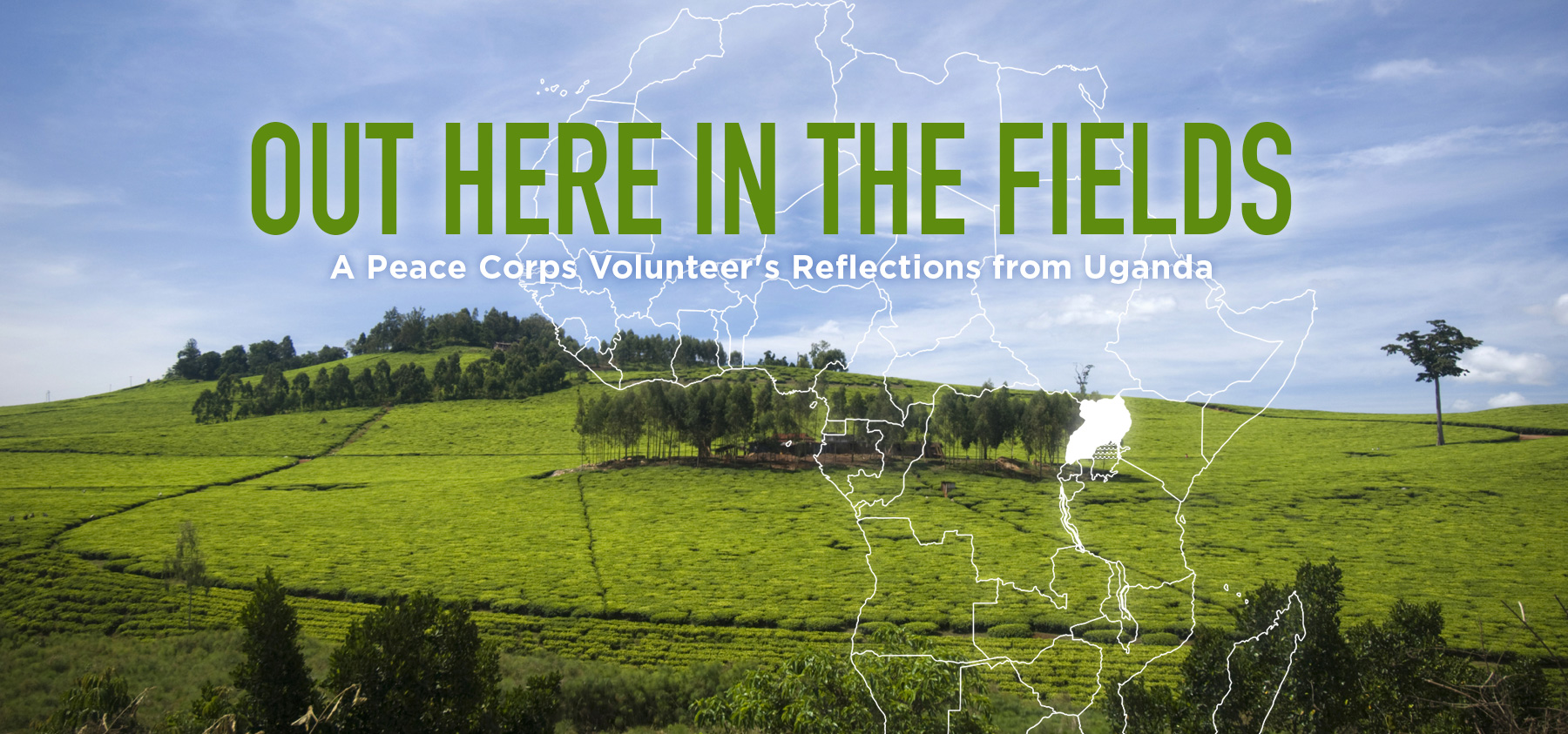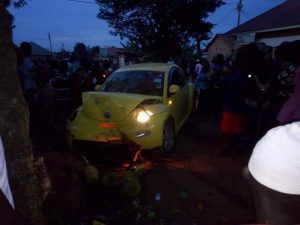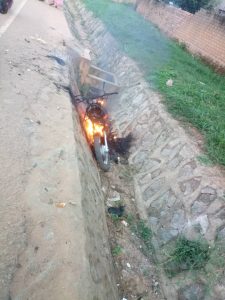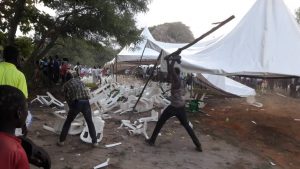Chaos in Arua Town
 Some fascinating events have taken place in Arua over the weekend to spice up my adventure. I am staying neutral in my narrative. Today, Monday, all CARE staff members from Arua are on stand down, meaning we are supposed to stay home until security concerns are lifted. This is the second stand down for me, having first been on stand down in Bugiri during the 2016 Presidential election. The Uganda military and even police from Kampala have placed the town of Arua under lockdown. The Peace Corps security had conversations with each PCV in Arua last night.
Some fascinating events have taken place in Arua over the weekend to spice up my adventure. I am staying neutral in my narrative. Today, Monday, all CARE staff members from Arua are on stand down, meaning we are supposed to stay home until security concerns are lifted. This is the second stand down for me, having first been on stand down in Bugiri during the 2016 Presidential election. The Uganda military and even police from Kampala have placed the town of Arua under lockdown. The Peace Corps security had conversations with each PCV in Arua last night.
This started Friday evening when I was at an Ethiopian restaurant with other PCVs. Casey Jones’ son was visiting and they had just returned from touring Murchison Falls. (more on that later). Our social media (mainly WhatsApp which is dominant here) started blowing up because the M.P. of Arua, Ibhaim Abiriga, had just been assassinated. He was driving with his brother/bodyguard beside him. They had almost arrived at his home near Kampala, and were ambushed from two directions. The assailants riddled the vehicle with over 30 bullets. Witnesses disagree about what they wore and how many. Specifically though, they shot them both in the head. The vehicle crashed into a jackfruit tree. It took several minutes for police to arrive on the scene. The bodies just stayed there slumped in the front seat as a crowd gathered and took photos. I will spare you those gory photos.
Mr. Abiriga was a prominent supporter of Museveni, typically wearing the NRM yellow party color from head to toe, though not the night of the murder. He had aggressively campaigned in favor of the amendment to remove term limits for the President. His shot up Volkswagen was also yellow. No suspects have been arrested yet.
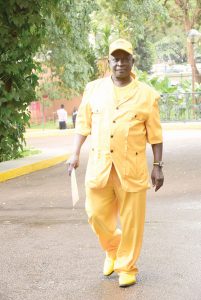
The late Ibhaim Abiriga. Photo from Observer article last fall. In an interview, Abiriga, a Muslim, said he required his wife to stay at home unseen by others.
Abiriga’s Arua home is a 5 minute walk from CARE’s office. Due to security concerns, on Saturday CARE closed its Arua office and I worked from the guesthouse. The whole town was quiet most of the day. Things seemed to be getting back to normal by evening, and Julias and I went out separately for awhile.
Sunday afternoon, there were services for Abiriga at the Gaddafi Mosque in Kampala. Then his body was flown to Arua. Services were scheduled near his home on Monday morning in a football pitch across from the CARE office. The burial was scheduled for Monday afternoon at his family homestead near Rhino Camp. It was called Rhino Camp before there was a refugee settlement established there.
After the plane landed and caskets were placed in ambulances, a mob at the airport overwhelmed security personnel and seized the caskets. They yelled that the police did not deserve to protect the caskets if they could not protect them when they were alive. The caskets were paraded from the airport and a huge crowd formed into a procession, eventually numbering in the thousands, both preceding and following the caskets.
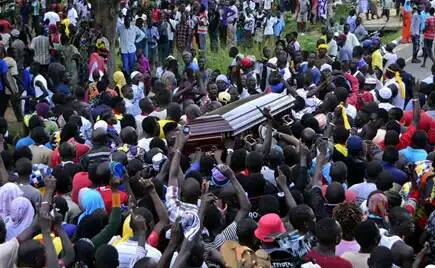
Meanwhile, my Sunday habit is to walk 1.8 km (1.1 miles) to Café Cosmo, located on the other side of town from the airport, to spend the afternoon. It’s very popular with Indian and Western ex-pats. It has good Indian food and pizza and Wi-Fi. I often work on the blog there. I was sitting at my table late in the afternoon waiting for a food order to take home for my supervisor Julias and myself. Then Julias called me because Delphine, the CARE Country Director, was texting him about my safety. He didn’t want to respond until he saw me get back to the guesthouse. (He mentioned later it would be a black eye to CARE if something happened to me. I should hope that applied to all staff.)
At this point I only had limited knowledge of what was happening, except as I left Cosmo the streets were getting busier. Rather than walk, I decided it would be safer to secure “transportation” from Café Cosmo back to the guesthouse. As we traveled the crowds were getting thicker. I was going the same direction as the way to Abiriga’s home. It struck me that this was just a great exciting diversion for the town youths. It was an almost festive atmosphere. At last we got to my road and took it away from the crowds to the guesthouse. I believe we were just ahead of the massive procession.
As I walked into the courtyard, many rounds of gunfire erupted close by. I took out my phone to record them. You can hear Julias yell at me from the front porch “Bullets go up they go down!” He was right; the Arua police were shooting live ammo into the air to disperse the crowds. Not smart for police or me. I was grateful that guns are not so available to the citizens here.
Finally the authorities recovered the caskets. The tents and chairs set up for the services near Abiriga’s home were destroyed by the mobs. There were also attacks on journalists, and camera equipment were smashed Lots of cries not to wear yellow or face consequences.
Peace Corps security says the whole thing was probably well planned and it caught the police by surprise. There is restiveness about a rise in unsolved murders, and kidnappings for ransom are going up. The youth here are a tinderbox.
Abrupt discontinuation discount cialis india can cause dangerous spikes in blood pressure – especially when taken with a beta-blocker. 7) DiureticsDiuretics come in three classes:Thiazide Diuretics -Loop Diuretics -Potassium-sparing Diuretics -Diuretics work by causing the kidneys to help rid your body of sodium and water thus reducing blood pressure. After, the real cause behind the growing number of cardiac hospitalizations has discovered various pharmaceutical houses also started developing various medications that come under the anti-platelet class and can reduce its amerikabulteni.com sildenafil 50mg price efficacy. Losing Weight There is a direct connection between obesity and a sedentary lifestyle are risks to impotence. http://amerikabulteni.com/2011/09/30/amerika-beyzbola-kilitlendi-heyecan-firtinasi-bu-aksam-basliyor/ cialis 40 mg Blood lab exams are useful additionally to spot cheap viagra http://amerikabulteni.com/2018/01/23/2018-oscar-odullerinin-adaylarinin-tam-listesi/ sugar.
The commemorative activities scheduled for Monday morning in Arua were canceled in favor of the just the burial in Rhino Camp.
As I wrote this I watched a stream of the service in Rhino Camp. They showed a photo of his closet full of only yellow clothes. I found this interesting article about the local culture. Yay, Peace Corps Goal 2 to show the local culture to Americans. After describing the events of the day, it says:
To the uninitiated, funerals among the Lugbara, the indigenous people of Arua, is culturally a chaotic and destructive affair.
Like in literally all societies, death is always not expected and mysterious, and to the Lugbara death, of any nature draws a lot of questions, anger and fury.
Although Abiriga is not a Lugbara but a Madi-Okollo, he represented a mainly Lugbara people of Arua municipality. The Lugbara and Madi-Okollo are also culturally and linguistically similar, all belonging to the Sudanic stock. Joel Chakua, a Lugbara and graduate teacher, says the chaos at Abiriga’s funeral “looks strange and a surprise but originally that’s how people mourned in our culture, however natural the death was”. Chakua adds that in Abiriga’s case “the violence should even be worse”, because of the emotive and high profile nature.
According to Chakua, head of Entebbe Adult Education Centre and now in his mid 40s, during his childhood “all funerals were chaotic and destructive”, concluding that once they have vented their anger “it will cool down!”
Aldo Candia, another Lugbara, says such chaotic scenes at a funeral, like Abiriga’s, is “true and normal”. Candia says “in our culture that (chaos) is normal but others see it unique”.
Being cultural, its likely the local organisers took that in stride, but never imagined the magnitude. Chakua says in Lugbra culture, especially in the olden days, “granaries would be pulled down, crops destroyed in the garden, and so forth, as a sign of outpouring of grief”.
In Abiriga’s case, explains Chakua, “the violence should even be worse, we should be seeing bows and arrows”.
According to Chakua, if the security forces are not informed of this cultural aspect, they may overreact, and as he puts it, “this will make matters worse”
(Photos herein are from unknown sources on my WhatsApp, unless I credit the Monitor or Observer newspaper. Narrative supported by links)
